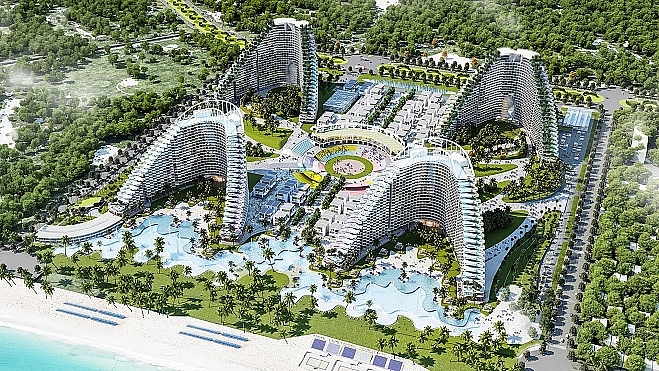Condotel licensing halt may lead to turbulence
 |
| illustration photo |
Nation-wide oversupply
Condotels first appeared in Vietnam a few years ago, but this real estate segment is developing strongly and receiving attention from both domestic and foreign investors.
According to the Vietnam Association of Real Estate Brokers, it is only since 2017 that there has been a boom in the supply of properties and condotel resort transactions. These are concentrated in the coastal areas, including Khanh Hoa, Danang, and Phu Quoc. There are also transactions in some developing tourist provinces such as Quang Ninh and Thanh Hoa. Some 23,000 condotel units have been built in Vietnam over the last two years, while around 29,000 more units are expected to hit the market by 2019. Condotel consumption, however, has not been as positive as expected. Only 33 per cent of new condotels were sold in 2017, just half the number reported in 2016. In the first half of 2018, the segment offered a total of 2,100 units to the market, but only 850 units were sold.
The surplus is increasing all around the market. Topping the high surplus list is Danang with 91 per cent, followed by the tourism hotspots of Phu Quoc Island and the southern province of Ba Ria-Vung Tau each with around 60 per cent of units unsold. The provinces of Binh Dinh and Khanh Hoa also have large surpluses, with 22 and 26 per cent unsold, respectively.
Michael Piro, COO of Indochina Capital, said that despite the surplus, Vietnam has tremendous opportunities for condotel development, but concerns are still raised over the speed in which it is progressing – meaning it is happening too quickly.
“The key driver for success and sustainability in this market is transparency. Developers need to be very open with buyers to make sure they are clear on both the risks associated with these types of purchases and the rewards,” Piro said.
Lack of legal framework
The current laws in Vietnam do not have comprehensive regulations regarding ownership rights and the management of condotels, which is a relatively new type of real estate in the domestic market.
Under the current Land Law, the maximum term for land allocation or lease for developers investing in projects is 50 years. Condotels are subject to regulations on terms of land use, while purely residential projects are not. Investors buying condotels will be given a certificate of ownership and land use rights without having to form housing units for a certain time in accordance with the land use terms of the project. As stipulated by the law, an extension may be granted at the end of the land-use term.
Meanwhile, under the Law on Tourism, a condotel is classified as a hotel project; therefore, it will not be granted a land-use certificate. In fact, due to unclear mechanisms, most condotel buyers have not been granted land-use rights and housing ownership certificates.
In Vietnam, there is still a lack of legal framework for most “hybrid” property types like office-tels, condotels, and home-tels. Since business environment and transparency are major factors affecting investment decisions, the shortage of a legal framework could easily lead to disputes between the buyers and the sellers.
High yield – balloon promises
Nguyen Manh Ha, deputy chairman of the Vietnam Real Estate Association, said that some condotel investors could not even keep their promises on yield to buyers and investors.
“High yield is one of the greatest attractions for buyers. However, it is risky to set yield too high, with some developers setting it at 12-15 per cent. High yield depends on many factors, which not every project can achieve,” Ha said.
Piro from Indochina Capital added that some developers are guaranteeing yields from 8-12 per cent for anywhere between eight and 10 years.
“These high guarantees are unique to the Vietnamese condotel market – no one in the world is offering returns on this level, which makes Vietnam a bit of an outlier in that sense – these returns are clearly quite aggressive,” Piro said. “I know from owning, running, and managing hotels that it is very difficult in the first four years of operation to be able to generate these types of returns organically, so I think it is really a question of cash management.”
Piro expressed his belief that over the next years, some developers will no longer be able to honour the commitments they made when they originally sold the units.
Turbulences may await
In face of these concerns, some local authorities have considered temporarily suspending licences for new condotel projects. However, the move is said to be having a big impact on the domestic real estate market. According to Mauro Gasparotti, director of Savills Hotels Asia-Pacific, it is uncertain how much this decision will impact the market. However, it will definitely limit the new supply of condotels and therefore favour resort and hotel development instead. “In addition, when developers are forced to shift away from condotels, they will put more effort into innovating and embracing new hospitality concepts and pay more attention to future operational performance,” Gasparotti said.
Meanwhile, Kai Marcus Schröter, general director of HTM Management Consultancy, commented that in the current circumstances, the halt in the granting of licences for new projects seems to be a sensible move. However, authorities are once more handling matters ‘reactively’ rather than foreseeing potential issues and being proactive.
“A halt decision will be difficult and even damaging. It will not only have a negative effect on project owners, but also impact the overall investment environment and infrastructure development in Vietnam. But it seems the government does not have much of a choice if it is to resolve the current issues. It is a choice of the ‘lesser evil.’ As usual, the issue is now how to go sensibly forward with this,” Schröter said.
VIR also contacted other condotel developers, however, the general answer was that the issue is very sensitive and it is not the time for them to comment on it. “Everything remains unclear and we are hoping for a brighter future for condotels when a legal framework is fully implemented,” said a developer of many condotel projects.
That said, the lack of proper guidance for developers, combined with product complexity, has caused some first-time developers to launch poorly planned projects, which later caused serious risks for both the buyers and the destinations.
However, a large number of these products mainly focus on providing “rooms” rather than truly bringing value to the destination with innovative and well-designed projects.
| Mauro Gasparotti - Director, Savills Hotels Asia-Pacific
A sudden decrease in licences could have an impact on the development of new areas, and might not be ideal for Vietnam’s hospitality development as a whole. But we hope that the new criteria will encourage better-quality products, with more emphasis on operation, design, facilities, landscaping, and greenery rather than high volumes and density. As the hospitality market is evolving new travel trends, new development approaches might lead to more sustainable growth. Kai Marcus SchrÖter - General director, HTM Management Consultancy
We have warned about the condotel business model in Vietnam many years ago, but nobody listened. It was like a gold rush: ‘invest and license now, ask questions later.’ This goes for all parties involved: authorities, investors, developers, buyers, and operators. There should at least be some restrictions, legislatively and geographically. But again, such actions would have to be embedded in long-term development master plans. The government needs to establish and enforce clear, firm, and professional rules and regulations on the investment, planning, development, management, and operation of new condotel projects. |
What the stars mean:
★ Poor ★ ★ Promising ★★★ Good ★★★★ Very good ★★★★★ Exceptional
 Tag:
Tag:
Related Contents
Latest News
More News
- Foreign leaders extend congratulations to Party General Secretary To Lam (January 25, 2026 | 10:01)
- 14th National Party Congress wraps up with success (January 25, 2026 | 09:49)
- Congratulations from VFF Central Committee's int’l partners to 14th National Party Congress (January 25, 2026 | 09:46)
- 14th Party Central Committee unanimously elects To Lam as General Secretary (January 23, 2026 | 16:22)
- Worldwide congratulations underscore confidence in Vietnam’s 14th Party Congress (January 23, 2026 | 09:02)
- Political parties, organisations, int’l friends send congratulations to 14th National Party Congress (January 22, 2026 | 09:33)
- Press release on second working day of 14th National Party Congress (January 22, 2026 | 09:19)
- 14th National Party Congress: Japanese media highlight Vietnam’s growth targets (January 21, 2026 | 09:46)
- 14th National Party Congress: Driving force for Vietnam to continue renewal, innovation, breakthroughs (January 21, 2026 | 09:42)
- Vietnam remains spiritual support for progressive forces: Colombian party leader (January 21, 2026 | 08:00)
























 Mobile Version
Mobile Version